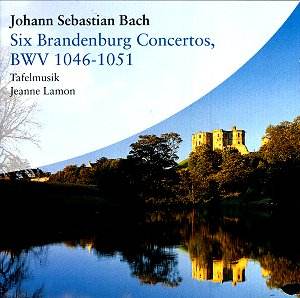Listening to the second of the six Brandenburg Concertos
in these reissued performances by Tafelmusic gives the overall flavour
of this interesting set. The two outer movements are taken at tempi
that are rapid in the modern way Ė consistently one or two metronome
points above Benjamin Brittenís interesting versions from 1968 Ė but
always comfortable and logical, with no extreme positions taken and
the playing never seeming rushed. Phrasing in slow movements is natural
and affectionate, where tempi again are carefully chosen to allow the
music to move on but without hurrying. The playing of the four soloists
is first-class, technically secure without drawing attention to itself,
and the recording is excellent. One could end there and recommend this
set as an excellent opportunity to acquire all six Brandenburgs at a
knockdown price, and this is, indeed, my view. Yet there are two aspects
to these performances which trouble this listener, at least. First of
all, and compared to other readings, the playing is sometimes a little
lacking in charm. I think this is mainly a matter of accentuation which
can seem relentless, even heavy at times; and whilst Iím not advocating
full bow strokes in the romantic manner, I do find the playing too staccato
too much of the time, and with too little variety within the staccato
which results in playing which lacks affection. I also find a certain
rigidity of pulse, especially in the faster movements, though this is
all part of an overall view of the music to which Iím not totally attuned.
The other problem is that although we might admire playing which doesnít
seek to draw attention to itself, preferring to let the music speak
directly to the listener, there does seem to be a lack of personality
in the playing here, giving a sort of greyness for all its technical
accomplishment. I should state that neither of these worries troubled
an acquaintance who listened, as it were, blind. Nor was I so bothered
by them when I abandoned the idea of listening straight through the
discs in favour of one concerto at a time. All the same, even if Brittenís
view of these pieces is not the one we would feel happy with nowadays,
there is never any doubt that a strong musical personality is at work
there, which is also the case with Trevor Pinnock (DG) and Jordi Savall
(Astrée). If you like your Bach robust and businesslike these
performances by Tafelmusik should certainly suit you, and they are certainly
very cheap, but I think you can find more character elsewhere.
The front and back covers of the booklet accompanying
this issue carry a lovely photograph of a castle with an island in the
middle of a lake. Itís well-nigh impossible to be sure of any link between
this and the programme, but more important, when you open the booklet,
although you find the usual track listing and an interesting article
(in English only) by Julian Haylock, there is no information at all
about the performers nor about the circumstances of the recording. This
is a pity, since despite the slight reservations I mention above the
performances are excellent, and in the very extensive company of all
the different period music groups, Tafelmusik are not the best known
so it would have been welcome to have some information about them. More
serious still is the lack of any information about the soloists. They
are outstanding, and it seems to me criminal not to identify them. The
excellent violin soloist is presumably the director herself, Jeanne
Lamon, but the harpsichord playing is first rate throughout, and particularly
in the long solo in the Fifth Concertoís first movement. And the stratospheric
trumpet playing in the Second Concerto is as brilliant as it is self-effacing.
We ought to know who these players are.
William Hedley
We have information
that the harpsichordist was Charlotte Nediger


